 | |
Bahrain | Germany |
|---|---|
Bahrain-Germany relations have existed since 1972 and are described as "good" by the German Foreign Office. Germany enjoys a good reputation in the country of Bahrain, and the German economy in particular is highly regarded. [1]
 | |
Bahrain | Germany |
|---|---|
Bahrain-Germany relations have existed since 1972 and are described as "good" by the German Foreign Office. Germany enjoys a good reputation in the country of Bahrain, and the German economy in particular is highly regarded. [1]
Bahrain became independent of the United Kingdom in 1971 and established diplomatic relations with the Federal Republic of Germany one year later. In 1986, the German Embassy was opened in Manama. In 2008, Bahraini monarch Hamad bin Isa Al Khalifa visited the German capital Berlin, and two years later, German Chancellor Angela Merkel and Bundestag President Norbert Lammert visited Bahrain in return. During the Arab Spring, Crown Prince Salman bin Hamad Al Khalifa visited Berlin in 2011 to review the events. In 2014, Bundestag Vice President Claudia Roth visited Bahrain. [1] [2]
The total volume of trade with Bahrain amounted to over 660 million euros in 2021, putting Bahrain in 92nd place in the ranking of German trading partners. [3] Nearly 30 German companies are represented in Bahrain, including many small and medium-sized enterprises. Nearly 500 German citizens live in Bahrain. A bilateral investment promotion and protection agreement was signed in 2007 and entered into force in 2010. [1]
The German Academic Exchange Service and the Goethe-Institut are active in the country through their offices in Abu Dhabi and have intensified university and student exchanges. German language courses have been offered by the German Embassy since 2009. In 2013, the Berlin-Brandenburg Academy of Sciences and Humanities founded the Arab German Young Academy (AGYA) together with the Arabian Gulf University in Bahrain to promote young scientists and facilitate research collaboration. [1]
Germans Wolfgang Sidka (2000–2003, 2005) and Hans-Peter Briegel (2006–2007) were coaches of the Bahrain national football team. Michael Roth briefly coached Bahrain's national handball team in 2020. [2]
German defense companies supplied various weapons to Bahrain, including combat aircraft (2016), helicopters (1977–1994), assault rifles, and submachine guns (2003). [4]

Germany–Morocco relations date back to the 19th century. The German Foreign Office describes Morocco as a "central partner of the European Union and Germany in North Africa," and Germany is an important trading partner for Morocco. In the past, however, relations have not always been entirely free of tension.

Relations between Germany and Algeria are described as "good" by the German Federal Foreign Office. Germany is among Algeria's most important trading partners. The two countries concluded an energy partnership in 2015.

Germany–Niger relations focus primarily on cooperation in development, security, and migration policy. Since 2016, bilateral relations have been significantly intensified, with several state visits at the highest level.
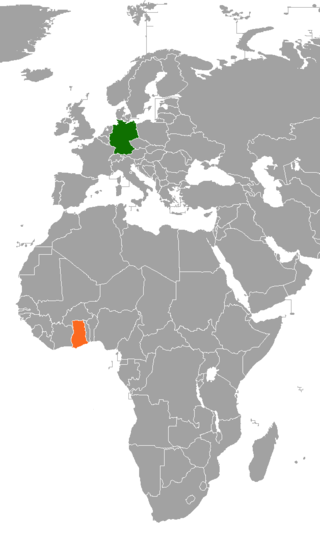
Germany–Ghana relations are good and Ghana is one of the priority countries for German development aid. Official diplomatic relations between the two countries were established in the 1950s, but contacts between the two societies go back much further and can be traced back to the 17th century.

Germany–Somalia relations have intensified since 2012 after the political and security situation in Somalia improved, according to information from the German Foreign Office. Germany has not had an ambassador to Somalia since 1989, and the German Ambassador in Nairobi is responsible for relations with Somalia instead.

Democratic Republic of the Congo–Germany relations are primarily characterized by the development aid that Germany provides in the DR Congo. Germany is one of the most important donor countries to the DR Congo.

German-Uganda relations have existed since 1962 and are described by the Foreign Office as "positive". Uganda is one of the priority countries of German development aid and more than 100 associations and initiatives from Germany support humanitarian projects in Uganda.
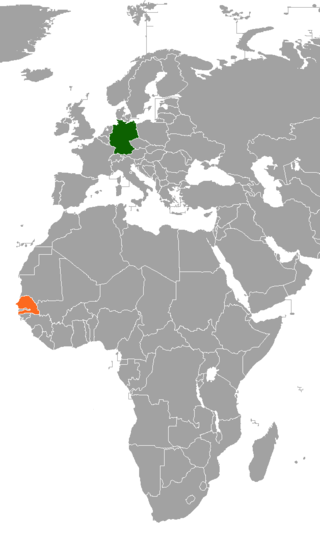
Germany–Senegal relations are the bilateral relations between Germany and Senegal. The relations are described by the German Foreign Office as "friendly." The two countries share a close partnership in development cooperation, and numerous cultural ties exist between the two countries.

On the diplomatic level, Colombia–Germany relations have existed since 1872 and thus for more than 140 years.

Germany–Rwanda relations are good and there is a "close and pragmatic" relationship between the two countries, according to the German Foreign Office. In the 21st century, Germany is one of the most important donors of development aid to Rwanda.

Germany–South Sudan relations have existed since the independence of South Sudan in 2011. In the context of the civil war in South Sudan, the Federal Republic of Germany became an important donor of humanitarian aid to South Sudan.

Germany–Mali relations gained depth and intensity in the 2010s as the German government stepped up its efforts to stabilize the Sahel region, and there were an increasing number of bilateral state visits. Germany is also increasingly engaged in security policy in Mali.
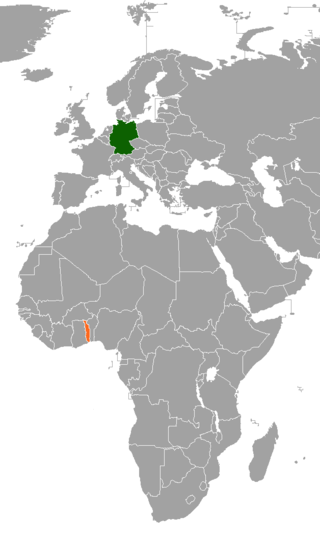
Germany–Togo relations are shaped by the shared past of both countries. From 1884 to 1914, Togo was a colony of Germany under the name of Togoland.

Germany–Mauritania relations are described as "good" by the German Foreign Office, and Germany provides development aid to Mauritania. However, state visits at the bilateral level are rare.

Eritrea–Germany relations have existed since Eritrea's independence from Ethiopia in 1993, but they are strained by the poor human rights situation in Eritrea. Among Afro-Germans, Eritreans are now among the largest groups.
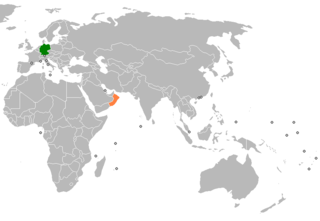
Germany–Oman relations are described by the German Foreign Office as "good and friendly". Germany is one of Oman's most important economic partners in areas outside the oil industry.

Germany–Madagascar relations are "traditionally friendly", according to the German Foreign Office. Diplomatic contacts have been maintained between the two countries since the 19th century. In the 21st century, relations between the two countries are predominantly characterized by development cooperation.

The quality of Germany–Guinea relations has been subject to some fluctuations since bilateral relations were established in 1958. Due to its long history of cooperation in development policy, the Federal Republic of Germany enjoys a good reputation among the Guinean public.
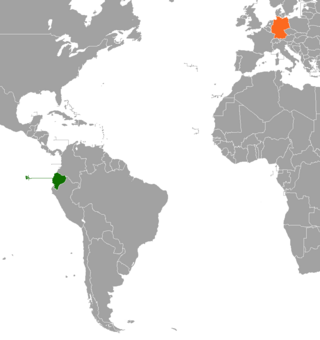
Ecuador–Germany relations have existed since 1922, and in the 21st century they focus on development cooperation, environmental policy, trade and investment and education.

Germany–Laos relations have existed on the bilateral level since the late 1950s.